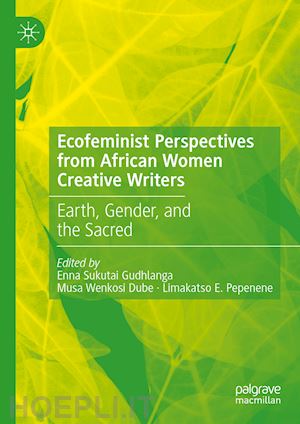
Questo prodotto usufruisce delle SPEDIZIONI GRATIS
selezionando l'opzione Corriere Veloce in fase di ordine.
Pagabile anche con Carta della cultura giovani e del merito, 18App Bonus Cultura e Carta del Docente
This volume explores contemporary African women’s creative writing, highlighting their contributions to ecofeminist theology. Contributors address the following questions: How do contemporary African women writers depict the Earth/land/environment and its relationship to women in various contexts? How is religion featured in African women’s writing? How does religious literature (scriptures) form an intertextual layer in African women’s writing? The contributors proceed by analyzing the intersection of religion, gender, class, sexuality, colonialism, and ecology in selected texts written by African women. They bring these texts into conversation with broader eco-feminist theological scholarship, exploring the potential of literary writing to contribute to theological discourse of liberation and social justice in the African and global arena.
Chapter 1. African Eco-Feminisms--African Women Writing Earth, Gender and the Sacred.- Chapter 2. Restoring Religion to the Land: Gender, Race, and Ecology in the Literature of Paulina Chiziane.- Chapter 3. Creating while black and female: Tsitsi Dangarembga’s African feminist decolonial imaginary.- Chapter 4. Religion, Gender and Earth Categories in Lauri Kubuetsile’s But Deliver us from Evil (2019).- Chapter 5. Kwasuka-sukela: A new paradigm to the African stories of women in Futhi Ntshingila’s Shameless and They Got to You Too.- Chapter 6. The intersection of Earth, Gender and the Sacred in NoViolet Bulawayo’s We need new names: Eco-Critical African feminist and Social Semiotics perspectives.- Chapter 7. Postcolonial Dislocation and the Psyche: Connecting the dots in Tsitsi Dangarembga's This Mournable Body.- Chapter 8.- “That’s what happens when two worlds collide”: An intersectional reading of Bessie Heads short stories, “The Collector of Treasures and other Botswana Village Tales”.- Chapter 9.- Generational search for home: History, race and gendered perspectives in Yaa Gyasi’s Homegoing.- Chapter 10.- Border Crossing: Religion, Gender, Race and Class in the Journeys of Ifemelu in Americanah.- Chapter 11. The Dragonfly Sea: The Sea, the Land and One African Woman’s Voyage-in.- Chapter 12. The Victims: An African-Ecofeminist Reading.- Chapter 13. Marginality, cultural positioning and religion in ’Mpho ’M’atsepo Nthunya’s Singing Away the Hunger: Stories of a life in Lesotho.- Chapter 14. All Water is Connected: African Earth Spirituality and Queering Identity in AkwaekeEmezi’s Freshwater.- Chapter 15. Earth, Gender and Religion in Zambia: An Eco-Feminist Reading of Sula and Ja, A Novel by Ellen Banda-Aaku.
Enna Sukutai Gudhlanga is Associate Professor in the Department of Languages and Literature at Zimbabwe Open University.
Musa Wenkosi. Dube is Professor of New Testament at the Candler School of Theology, Emory University, USA.
Limakatso Pepenene is Senior Lecturer in the French Department at the National University of Lesotho.











Il sito utilizza cookie ed altri strumenti di tracciamento che raccolgono informazioni dal dispositivo dell’utente. Oltre ai cookie tecnici ed analitici aggregati, strettamente necessari per il funzionamento di questo sito web, previo consenso dell’utente possono essere installati cookie di profilazione e marketing e cookie dei social media. Cliccando su “Accetto tutti i cookie” saranno attivate tutte le categorie di cookie. Per accettare solo deterninate categorie di cookie, cliccare invece su “Impostazioni cookie”. Chiudendo il banner o continuando a navigare saranno installati solo cookie tecnici. Per maggiori dettagli, consultare la Cookie Policy.